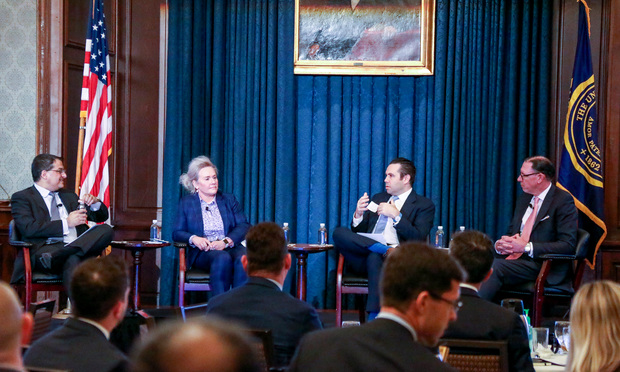Allow Artificial Intelligence to Supplement Decisions, Not Make Them
"Until we work through a lot of these things, it has to be that we use a model that informs the human being who has the final say," Anish Bhimani, chief information officer for commercial banking at JPMorgan Chase, said at a panel event Wednesday in Philadelphia.
March 04, 2020 at 04:33 PM
3 minute read
 (left to right): Anish Bhimani, CIO for commercial banking at JPMorgan Chase; Tess Blair, partner at Morgan, Lewis & Bockius; Chris DiMarco, founder and CEO of Perpay; and Marc Lederman, co-founder and general partner at NewSpring Capital, at JPMorgan Chase's Data Optimization and the Path to Innovation event Wednesday in Philadelphia. Photo: Joe Vericker
(left to right): Anish Bhimani, CIO for commercial banking at JPMorgan Chase; Tess Blair, partner at Morgan, Lewis & Bockius; Chris DiMarco, founder and CEO of Perpay; and Marc Lederman, co-founder and general partner at NewSpring Capital, at JPMorgan Chase's Data Optimization and the Path to Innovation event Wednesday in Philadelphia. Photo: Joe Vericker
Using artificial intelligence to help inform decisions rather than to make decisions in place of people is the best way to comply with a patchwork of state laws surrounding the use of data and artificial intelligence, a panel said at JPMorgan Chase's Optimization and the Path to Innovation event Wednesday in Philadelphia.
For artificial intelligence and machine learning technology to properly work, there needs to be a large amount of diverse data plugged into it. However, the data plugged into the machines may be biased and new data privacy laws coming from the different states are beginning to impact how artificial intelligence is used.
"The biggest challenge is staying on top of what is happening in the U.S.," Tess Blair, a partner at Morgan, Lewis & Bockius in Philadelphia, said.
While the California Consumer Privacy Act has been getting a lot of attention, Blair explained bills governing data privacy are being considered in Nevada, Illinois, Maine and Washington. Earlier this year Illinois' Artificial Intelligence Video Interview Act went into effect. The law requires employers to inform prospective employees if artificial intelligence will be used during the interview process. Legislators in New York City and in New York state have introduced similar bills.
"We're down to that level of granularity here," Blair said.
Some companies have been using artificial intelligence to score prospective candidates during interviews based on facial expression and tone. However, critics of that use of artificial intelligence have argued that the machines are biased.
"There are examples that I've heard of where there is clearly bias built into these things," said Marc Lederman, co-founder and general partner of NewSpring Capital in Radnor, Pennsylvania. "It is unintentional bias in many cases because people built these programs based on their view of the world."
Outside of the hiring processes, the panel said artificial intelligence technology should be used to supplement information. Blair said companies are at a greater risk of running afoul of regulators if they rely too heavily on machine learning.
"Until we work through a lot of these things, it has to be that we use a model that informs the human being who has the final say," Anish Bhimani, chief information officer for commercial banking at JPMorgan Chase, said.
Before beginning to use data for artificial intelligence purposes, Blair told the crowd that companies and their counsel should be looking at the life cycle of data they collect in three ways: data acquisition, security and sharing.
"Depending on what industry you're in, you need to have all of that in place before you do anything with the data," Blair said.
This content has been archived. It is available through our partners, LexisNexis® and Bloomberg Law.
To view this content, please continue to their sites.
Not a Lexis Subscriber?
Subscribe Now
Not a Bloomberg Law Subscriber?
Subscribe Now
NOT FOR REPRINT
© 2025 ALM Global, LLC, All Rights Reserved. Request academic re-use from www.copyright.com. All other uses, submit a request to [email protected]. For more information visit Asset & Logo Licensing.
You Might Like
View All
FTC Sues PepsiCo for Alleged Price Break to Big-Box Retailer, Incurs Holyoak's Wrath
5 minute read
Wells Fargo and Bank of America Agree to Pay Combined $60 Million to Settle SEC Probe

MLB's Texas Rangers Search for a New GC and a Broadcasting Deal

Survey Finds Majority of Legal Professionals Still Intimidated by AI Despite Need to Streamline Mounting Caseloads
Law Firms Mentioned
Trending Stories
- 1'A Death Sentence for TikTok'?: Litigators and Experts Weigh Impact of Potential Ban on Creators and Data Privacy
- 2Bribery Case Against Former Lt. Gov. Brian Benjamin Is Dropped
- 3‘Extremely Disturbing’: AI Firms Face Class Action by ‘Taskers’ Exposed to Traumatic Content
- 4State Appeals Court Revives BraunHagey Lawsuit Alleging $4.2M Unlawful Wire to China
- 5Invoking Trump, AG Bonta Reminds Lawyers of Duties to Noncitizens in Plea Dealing
Who Got The Work
J. Brugh Lower of Gibbons has entered an appearance for industrial equipment supplier Devco Corporation in a pending trademark infringement lawsuit. The suit, accusing the defendant of selling knock-off Graco products, was filed Dec. 18 in New Jersey District Court by Rivkin Radler on behalf of Graco Inc. and Graco Minnesota. The case, assigned to U.S. District Judge Zahid N. Quraishi, is 3:24-cv-11294, Graco Inc. et al v. Devco Corporation.
Who Got The Work
Rebecca Maller-Stein and Kent A. Yalowitz of Arnold & Porter Kaye Scholer have entered their appearances for Hanaco Venture Capital and its executives, Lior Prosor and David Frankel, in a pending securities lawsuit. The action, filed on Dec. 24 in New York Southern District Court by Zell, Aron & Co. on behalf of Goldeneye Advisors, accuses the defendants of negligently and fraudulently managing the plaintiff's $1 million investment. The case, assigned to U.S. District Judge Vernon S. Broderick, is 1:24-cv-09918, Goldeneye Advisors, LLC v. Hanaco Venture Capital, Ltd. et al.
Who Got The Work
Attorneys from A&O Shearman has stepped in as defense counsel for Toronto-Dominion Bank and other defendants in a pending securities class action. The suit, filed Dec. 11 in New York Southern District Court by Bleichmar Fonti & Auld, accuses the defendants of concealing the bank's 'pervasive' deficiencies in regards to its compliance with the Bank Secrecy Act and the quality of its anti-money laundering controls. The case, assigned to U.S. District Judge Arun Subramanian, is 1:24-cv-09445, Gonzalez v. The Toronto-Dominion Bank et al.
Who Got The Work
Crown Castle International, a Pennsylvania company providing shared communications infrastructure, has turned to Luke D. Wolf of Gordon Rees Scully Mansukhani to fend off a pending breach-of-contract lawsuit. The court action, filed Nov. 25 in Michigan Eastern District Court by Hooper Hathaway PC on behalf of The Town Residences LLC, accuses Crown Castle of failing to transfer approximately $30,000 in utility payments from T-Mobile in breach of a roof-top lease and assignment agreement. The case, assigned to U.S. District Judge Susan K. Declercq, is 2:24-cv-13131, The Town Residences LLC v. T-Mobile US, Inc. et al.
Who Got The Work
Wilfred P. Coronato and Daniel M. Schwartz of McCarter & English have stepped in as defense counsel to Electrolux Home Products Inc. in a pending product liability lawsuit. The court action, filed Nov. 26 in New York Eastern District Court by Poulos Lopiccolo PC and Nagel Rice LLP on behalf of David Stern, alleges that the defendant's refrigerators’ drawers and shelving repeatedly break and fall apart within months after purchase. The case, assigned to U.S. District Judge Joan M. Azrack, is 2:24-cv-08204, Stern v. Electrolux Home Products, Inc.
Featured Firms
Law Offices of Gary Martin Hays & Associates, P.C.
(470) 294-1674
Law Offices of Mark E. Salomone
(857) 444-6468
Smith & Hassler
(713) 739-1250






